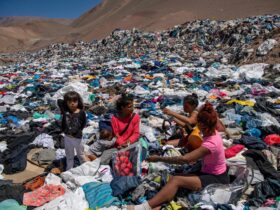In many ways, the coronavirus pandemic has started a global biotechnology “race.” Powerful countries have rapidly invested in vaccine research, eager not only to attain a sense of normalcy for citizens, but to display technological dominance. The results have been astonishing: Chinese scientists had already mapped the genomic virus code of the coronavirus before it even had a name, pharmaceutical companies launched Phase 3 trials in half a year instead of the normal two years, and Russia has already approved a vaccine, despite international scepticism on the vaccine’s safety.
Yet, amid scientific fanfare about the latest genomic models and antigens, governments have started to question a less flashy side of vaccine development: How will pharmaceutical corporations acquire the necessary resources to manufacture millions of vaccines?
Without a doubt, vaccines use some bizarre ingredients. These rare ingredients pose a substantial challenge to the development and dissemination of a widespread coronavirus vaccine. And two of the most important ingredients, horseshoe crab blood and shark liver, pose a unique challenge to research, development and large-scale production of the vaccine.
The horseshoe crab, or Limulus polyphemus, is a species of arthropod that is vital to the vaccine supply chain because of its blue blood. Horseshoe crab blood has an extreme sensitivity to neurotoxins and will clot in response to even the smallest amounts. Thus, scientists use horseshoe crab blood to detect deadly neurotoxins in all vaccines — this procedure is called the Limulus Amebocyte Lysate (LAL) test. Without horseshoe crab blood and the LAL test, vaccines could pose a significant public health risk.
Although horseshoe crabs have existed for over 400 million years, habitat loss and overharvesting threaten their population. As the demand for vaccines has increased throughout the 21st century, horseshoe crab populations have been dwindling. Although horseshoe crab blood can be harvested without killing the crab, some scientists estimate that between 10% to 15% of crabs die upon return to the ocean, and the crabs are less likely to return to the same beaches to mate. Scientists are unsure of the long term survival rates of horseshoe crabs after bleeding, and many crabs may continue to die in the weeks after their release. In Delaware Bay, USA, horseshoe crab populations have fallen by 90% over the past 15 years. In China, where horseshoe crabs are sold as food after being bled by pharmaceutical companies, the crabs are experiencing similar declines in population.
Falling horseshoe crab populations pose a dire threat to vaccine supply chains across the World. Although intensive conservation efforts have been launched in order to preserve horseshoe crab populations, many experts worry that these efforts may not be enough. The enormous projected demand for a global COVID-19 vaccine will effectively negate previous conservation efforts.
In order to preserve horseshoe crab populations, pharmaceutical firms must utilize synthetic alternatives for LAL testing. Fortunately, synthetic LAL has already been created. In Singapore, test kits that used genetically spliced LAL in insect gut cells have already been marketed as early as 2003. However, pharmaceutical companies have shown little interest in the insect gut LAL, because of supply chain uncertainty.
Increased subsidization of synthetic LAL production will be necessary in order for countries to sustainably produce vaccines. Insect-based LAL alternatives will not only protect local environments but will also protect horseshoe crabs as a renewable resource for other vaccines. For major countries in the vaccine race that do not have access to warm shorelines, including Russia, synthetic LAL production will enable them to control their own supply chains.
As for shark livers, this bizarre ingredient contains another crucial, vaccine element: squalene. Although all animals produce squalene, most commercial squalene is extracted from shark liver oil. Squalene is an oil that contains smaller molecules that act as immunologic adjuvants, or molecules that stimulate the immune system in order to elicit a stronger immune response to the vaccine agents. Some may argue that Squalene is not necessary for vaccine production, although evidence has consistently suggested that Squalene lowers the risk for autoimmune disease slightly. SharkAllies, a nonprofit advocacy group for shark conservation, claims that five vaccine producers plan to use Squalene in their vaccines. Some conservationists estimate that up to 500,000 sharks will be killed for COVID-19 vaccine production.
Shark liver harvesting has the potential to destroy ecosystems and diminish the amount of usable squalene in the environment. Thus, countries must turn to alternative sources of immunologic adjuvants. Recent research has shown that squalene may be processed from plant oils, including olive oil and corn oil. Although plant oil-based squalene is currently not economically viable, new innovative processes — including a labour intensive distillation process called deodorization distillation — may help facilitate plant-based squalene.
Countries’ abilities to create widespread vaccines will thus depend largely on their ability to manufacture squalene from plant-based sources. This may be difficult, considering that plant-based squalene alternatives contain considerably less squalene than shark liver-based squalene. However, the continued usage of shark-liver squalene may become cost-prohibitive as overfishing and environmental concerns further decrease shark stocks. Additionally, environmental regulations in Western countries, including the United States, may cause additional complications for shark harvesting.
The reliance on horseshoe crab blood and shark liver oil in vaccine countries will be a barrier to vaccine mass production. In addition to being valuable non-renewable environmental resources, these archaic ingredients pose a complex threat to supply chains. However, new biochemical research has produced viable alternatives to horseshoe crab blood and shark liver oil— including insect-gut LAL and vegetable oil squalene. In the meantime, these bizarre yet overlooked ingredients will play an integral role in countries’ abilities to secure a universal vaccine.







